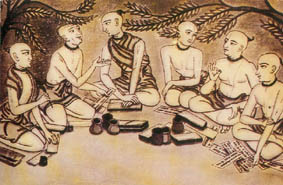History of Vrindavana
Introduction
The Lord Descends Discovery
of Vrindavana by Lord Chaitanya
Srila Prabhupada
The Sacred River Yamuna Vrindavana
Parikrama
The Six Goswamis
Who is Lord Chaitanya?
Who are Radha and Krishna?
 It was the six Gosvamis who not only founded this holy
city of Vrindavana but also firmly established the teachings of Lord Chaitanya
Mahaprabhu through their various writings. They explained the doctrine and
philosophy of Sri Chaitanya for the benefit of the whole world. The two brothers
Rupa and Sanatana Gosvamis were ordered by Lord Chaitanya in the year 1516 to go
and live in Vrindavana and search out all the lost holy places connected with
Lord Sri Krishna's transcendental pastimes.
It was the six Gosvamis who not only founded this holy
city of Vrindavana but also firmly established the teachings of Lord Chaitanya
Mahaprabhu through their various writings. They explained the doctrine and
philosophy of Sri Chaitanya for the benefit of the whole world. The two brothers
Rupa and Sanatana Gosvamis were ordered by Lord Chaitanya in the year 1516 to go
and live in Vrindavana and search out all the lost holy places connected with
Lord Sri Krishna's transcendental pastimes.
He also ordered them to compile
books on the great science of bhakti-yoga, the process of devotional service to
God. In their sacred mission, Rupa and Sanatana Gosvamis were ably assisted by
Raghunatha dasa, Raghunatha Bhatta, Gopala Bhatta and Jiva who altogether formed
the famous transcendental group, the six Gosvamis of Vrindavana.
Even though both
Rupa and Sanatana were very important ministers in the government of Bengal, by
the divine inspiration of Lord Chaitanya, they completely renounced mundane
family life in order to fully serve the mission of Lord Chaitanya. When they
first came to Vrindavana, it was just a large forest, and at night they would
sleep under the trees. They dressed only in simple kaupins (loincloths), and
subsisted on forest roots and dry chapatis obtained by begging alms (madhukari).
The six Gosvamis hardly slept more than two hours a day and spent most of their
time in meditation and writing books on the science of bhakti-yoga. Some of
their original works, written on parchment leaves, have been preserved and can
be seen at the Vrindavana Research Institute. The fame of the six Gosvamis spread
so far and wide that even Emperor Akbar decided to pay a visit to Vrindavana in
the year 1570. Jiva Gosvami led him blindfolded into the sacred kunja of
Nidhuvana. So great was the Emperor's spiritual experience there, that to
commemorate the event, he granted permission to construct four grand temples
dedicated to Lord Krishna. The temples were Govindaji, Gopinatha, Madana-mohana
and Jugal-kisore. The Emperor also donated funds to set up a library for the
preservation of the Gosvami's books at Radha-Damodara temple. This library used
to be in the room to the left of the altar and is still known as grantha ghar
(book house). Akbar even provided first class sandstone, normally reserved for
the Emperor's palaces and forts; such was his appreciation for the six Gosvamis.
Unfortunately, one hundred years later, these same temples were desecrated by
the soldiers of Emperor Aurangzeb, the Muslim zealot, in the year 1670.
top of page